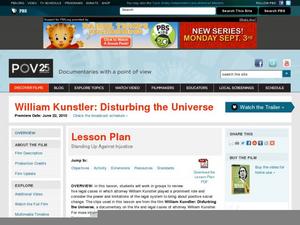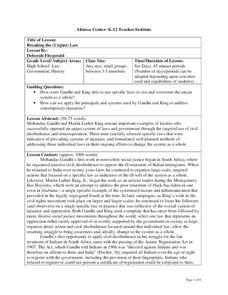Museum of Tolerance
The Pursuit of Democracy and Diversity: The Trial of Pro-Social Injustice in Historical Documents and Accounts
Class members investigate The Indian Removal Act of 1830, U.S. Theft of Mexican Territory Timeline, and President Abraham Lincoln’s letter to Horace Greeley, 1862, and then conduct a mock trial of each of these documents to determine...
Teaching Tolerance
Using Photographs to Teach Social Justice | Exposing Homelessness and Poverty
Photos can capture a complete story in a single image. Class members closely examine a photo of a homeless camp and attempt to read the story told by the picture. They then read the caption for the photograph and compare their notes with...
Curated OER
Satyagrah: Social Change vs. Social Transformation
Students examine the difference between social change and social transformation. they learn through discussion in order to be able to research and analyze a systematic social injustice. Students identify their part in a wider social...
Teaching Tolerance
Act Up! Drama for Justice
A lesson turns young historians into playwrights to understand and speak out against social injustice. Pupils work individually or in groups to write and perform monologues that deliver personal messages on social justice. Writers then...
Facing History and Ourselves
The Costs and Benefits of Belonging
Peer pressure and the desire for acceptance are powerful things. A thought-provoking lesson looks at the positive and negative effects of wanting to belong to a group. Class members examine the roles of the perpetrator, the victim, the...
Museum of Tolerance
And Justice for All? Slavery Not Just in the Past
Slavery in India, Sudan, and Mauritania? What about in the United States? Groups research modern slavery in these four countries, collecting factual evidence (What), determine their feelings about this evidence (So what), and consider...
Newseum
Making a Change: Letter From Birmingham Jail
Martin Luther King Jr.'s "Letter From Birmingham Jail" was written in response to "A Call for Unity," written by eight white ministers from Birmingham and published in the local newspaper. After reading both letters and following a list...
PBS
Standing Up Against Injustice
“Sometimes things are lawful yet are actually wrong.” Researchers examine primary and secondary source materials as they study five legal cases involving civil rights attorney William Kunstler in which he attempted to use the legal...
Teaching Tolerance
Racial Disparity in the Criminal Justice System
Explore the impact of the war on drugs in a thought-provoking lesson plan for high school academics. Young historians delve into the world of the criminal justice system and the racial disparity that occurs in the US. The resource...
Curated OER
Social Protections and the European Union
Sixth graders take on the role of social welfare systems in the European Union. In this European Union (EU) lesson, 6th graders discover social programs in the EU and compare them to the social programs in the United States.
Facing History and Ourselves
Emmett Till: Choosing to Remember
Mamie Till, the mother of Emmett Till and civil rights activist, believed that her son's murder was the last straw before public outrage over racial injustice spilled over into the Civil Rights Movement of the 20th century. A history...
Curated OER
Turmoils of The 1960's and 70's.
Students engage in the study of the social problems associated with the 1960's and 1970's. They explain how the government made attempts to solve the problem and evaluate the success. This is done through the writing of an essay using...
Curated OER
What Made George Washington a Good Military Leader?
Students list qualities they believe made George Washington an effective military leader. They discuss some difficulties Washington faced as Commander-in-Chief and describe his response to the Newburgh Conspiracy.
Curated OER
Modern Advocates for Change
Learners make a list of "modern day prophets" and explain how they have made considerable contributions toward the common good. They write a letter to a community leader in which they advocate the solution to a problem or issue in their...
Advocates for Human Rights
The Right to Workers in United States
To raise awareness and understanding of modern-day slavery, class groups research the various forms of slavery, including human trafficking, read and reflect on case studies, and design a plan of action for their community.
Curated OER
Only 48 Hours
Students compare and contrast experiences of Les Aigner in Hungary and Kennie Namba in Oregon in being forced to relocate to concentration camps during WWII, and explore personal and social effects of prejudice, discrimination,...
Curated OER
Breaking the Unjust Law
Students consider the concept of civil disobedience. In this lesson on changing unjust laws, students use primary sources to understand how Gandhi and King changed the law. Students will then list laws that they feel are unjust and plan...
Museum of Tolerance
Essential Vocabulary and Concepts
Genocide. Scapegoat. Propaganda. Words are powerful. Words carry the weight of history. To prepare for a visit to The Museum of Tolerance, class members consider the weight of meaning in words related to intolerance.
Curated OER
The Glorious Revolution, the American Revolution, and the French Revolution
Students relate the Glorious Revolution, the American Revolution, and the French Revolution through web based research and scenarios.
ProCon
National Anthem Protests
San Francisco 49ers quarterback Colin Kaepernick refused to stand for the National Anthem in 2016 as a form of protest. Were his actions appropriate? Using the provided website, pupils attempt to decide for themselves by reading the main...
Curated OER
Life and Times: Dr. Martin Luther King, Jr. 1929-1968
The life and times of Martin Luther King Jr. are outlined in this simple-yet-informative presentation. This is an image-rich slide show depicting scenes from his personal and public life. A great resource to use with a unit on the civil...
Facing History and Ourselves
American Responses to the Armenian Genocide
Young scholars examine World War I war crimes. In this world history instructional activity, students use primary and secondary sources to research and understand the action taken by the United States during the Armenian Genocide. Young...
Curated OER
Segregation
Students consider the implications of prejudice. In this segregation lesson, students experience a simulation that has school staff favoring students with blue eyes. Students discuss the simulation experience, watch "The Eye of the...
Curated OER
Our Unfinished Work
Students investigate the racism elements after the election of President Barack Obama. In this racism lesson, students read a recent article about 'post-racial' society. Students compile a list of achieving a post-racial society and...

























